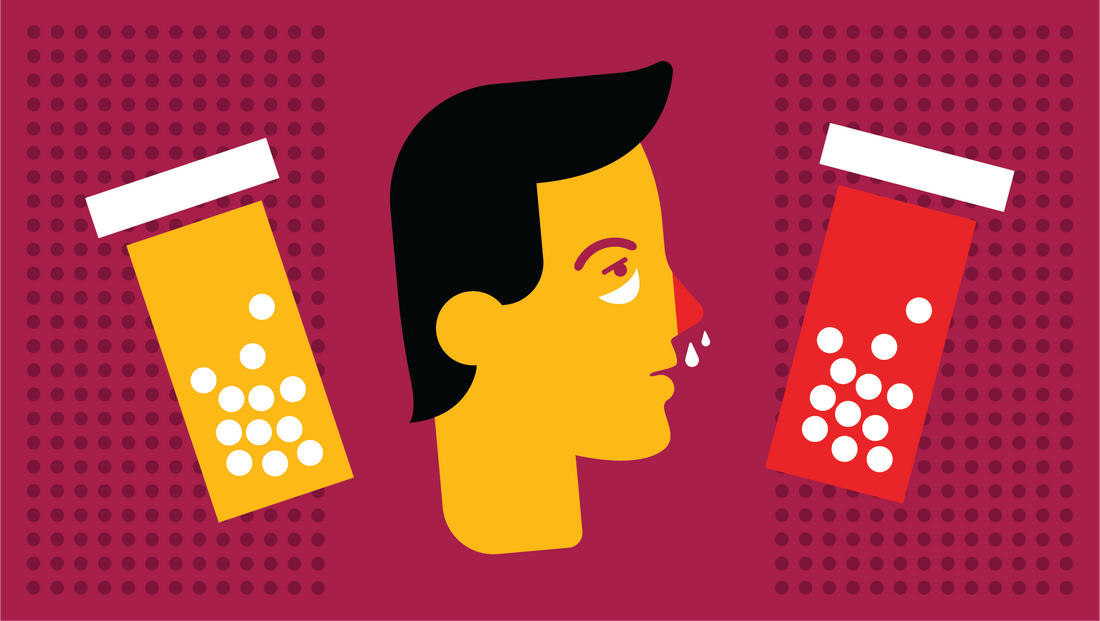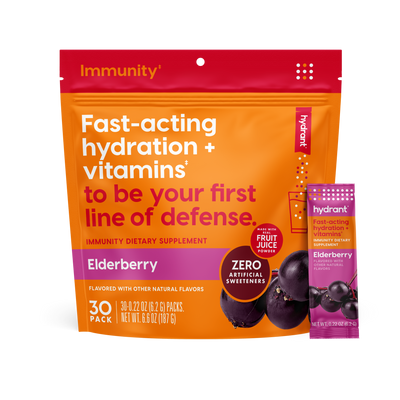When you feel like you're drowning in snot from the common cold or seasonal allergies, you probably turn to medications like Mucinex to dry it up. But taking meds like antihistamines can lead to a new problem: You feel like your mouth could double as the Sahara Desert.
Before you go pointing fingers at your pill cabinet, however, please take note: it isn't Mucinex that dehydrates you. Nor is it Mucinex-D, Mucinex-DM or any other decongestant containing the active ingredient guaifenesin.
Guaifenesin and dehydration: The truth
Guaifenesin, which helps loosen mucus and ease chest congestion, does not cause dehydration, according to Matthew Jennings, Pharm.D. [1]
As it turns out, no medications for the common cold actually dehydrate you—but some might make you feel thirsty, in need of eye drops, or otherwise dried out.
"Typically when people have that overly drying effect," Jennings says, "it's usually because they're taking too much of a particular medication."
So what among your common cold treatments is the culprit? "If you're feeling parched even after drinking water and downing a bowl of chicken noodle soup, start by looking in the direction of anything containing antihistamines."
An antihistamine helps relieve symptoms often associated with allergies, such as a runny nose or watery eyes. [2] The common cold causes similar symptoms, so antihistamines can be an effective treatment.
A common side effect of antihistamines is dry mouth, so you may feel thirsty without actually being dehydrated.
But here's where the plot thickens. There are medications that contain dehydrating ingredients, and you may be surprised to learn what they are.
What medications cause dehydration?

The medications that can cause true dehydration—that is, the absence of enough water in the body—are diuretics, Jennings says.
Your doctor may prescribe diuretics to treat medical conditions like high blood pressure, heart failure, and edema. [3] Some prescription diuretics include:
- Bumetanide (Bumex)
- Chlorthalidone (Hygroton)
- Chlorothiazide (Diuril)
- Ethacrynate (Edecrin)
- Furosemide (Lasix)
- Hydrochlorothiazide HCTZ (Esidrix, Hydrodiuril, Microzide)
- Indapamide (Lozol)
- Methyclothiazide (Enduron)
- Metolazone (Mykroz, Zaroxolyn)
- Torsemide (Demadex) [4]
Talk to your doctor or pharmacist if you're not sure whether your prescription medications can cause dehydration.
Caffeine is also a diuretic that may contribute to dehydration. [5] Over-the-counter medications that may contain caffeine include:
- Midol
- Excedrin
- NoDoz
These Medications make you feel "dry," but don't actually dehydrate you
Then, there are medications that have more of a "drying" effect—namely, antihistamines. You may take these medications for seasonal allergies, allergic reactions, the common cold, or motion sickness. Common side effects of antihistamines can include dry eyes (causing blurred vision), dry mouth, urinary retention, and constipation. Many over-the-counter cold medications are or include antihistamines, such as:
- Allegra
- Benadryl
- Claritin
- Zyrtec
- Dramamine
- Bonine
- NyQuil
Why do some medications dehydrate you?
There is a difference between actual dehydrating medications and those that give you a dried-out sensation, says Jennings. The goal of a diuretic is to remove excess fluid from the body, which can lower blood pressure and reduce swelling in the extremities. Dehydration would only occur if such a medication removed too much fluid from the body. Talk to your doctor if you're concerned.
Medications that dry you out—antihistamines—cause that side effect because they block a specific neurotransmitter in the brain, Jennings says.
Many patients experience drying side effects because they are taking too many antihistamines. "For example, if someone is taking a daily antihistamine for allergy symptoms and currently suffering from cold/flu symptoms, they might (not always knowingly) take a multi-symptoms product that results in a duplication of antihistamine," Jennings says.
Jennings gives the example of someone taking a daily antihistamine to fight seasonal allergies who then comes down with the common cold.
If they continue to take their daily allergy medication and introduce a product like NyQuil for overnight cold relief, they are doubling up on antihistamines and are more likely to experience extreme dryness. [6] Many consumers aren't aware of what's in their medications or how their medications may interact, Jennings adds.
Spray vs. Pills or Tablets: What dries you out more?

Pills or tablets have the capacity to dry you out all over, while nasal sprays will—you guessed it—dry out the passages in your nose.
"A nasal spray is going to have a more localized effect, while an oral medication has more systemic absorption as it enters the bloodstream," Jennings says.
Common over-the-counter nasal sprays include the decongestant Afrin (oxymetazoline) and corticosteroids such as Flonase and Nasonex. All can cause nasal irritation due to dryness.
What to do when medicine dehydrates you or dries you out
If you're dehydrated, suffering from dry mouth, or just plain thirsty, having a drink is this obvious answer.
"Depending on the degree of dehydration, it could have an effect on electrolyte levels," Jennings says.
That means, if you're just feeling dry and thirsty, you can drink water. But if you're consuming a medication that actually removes fluid from the body and dehydrates you (i.e., a diuretic), you need to look at replacing your electrolyte levels too.
A product like Hydrant, added to cold water, can bring your levels back to normal.
If you're regularly feeling parched and you think medication may be to blame, talk to your doctor or a pharmacist. They can speak to common side effects and any potential drug interactions that may occur.
“It's important for every patient to know exactly what they're taking and why, and what common side effects may occur as a result,” Jennings says. If you don't, seek medical advice from your doctor or a pharmacist. Seek medical advice before stopping or starting medications.
Other stories about hydration
If you want to read more about the science of hydration, click here.
How (de)hydrated are you?
Are you concerned about your own hydration levels? Take the quiz below to find the best Hydrant for your hydration routine.















